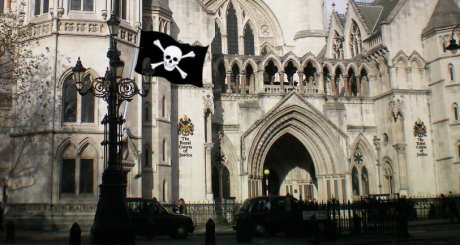Fate of UK anti-piracy law to be decided by High Court

The Digital Economy Bill, the UK anti-piracy law rushed through the wash-up of miscellany in the last days of the previous parliamentary session, is to be scrutinised by the High Court.
Both BT (British Telecoms) and TalkTalk, two major broadband providers in the UK, argue that the anti-piracy bill is unfair and was "rushed through Parliament" just before the then-government was dissolved.

The government is not immune from the courts. If this judicial review, where legislation or government policy is scrutinised and open to invalidation, proves that this law is illegal under higher European law or simply deemed unfair, the Digital Economy Bill could become null and void.
- Read more: Anti-piracy laws passed: 'Fears of wave of censorship' raised
- Read more: UK Election 2010: The tech policies in a nutshell
Many have opposed the Digital Economy Bill, which was initially focused to bring about changes to the economic infrastructure to boost industry - either through positive measures to increase funding in various areas, but also to crack down on pirates and illegal file-traders to ensure that major economic powers stay in business.
The act when passed was not properly scrutinised, with only 39 members of Parliament (MP's) voting out of a total then 646. This was a mere 6% of all of Britain's elected representatives.
Although some of the more controversial elements of the bill were rejected by the House of Commons earlier this year, ISP's are still required by the new law to 'blacklist' persistent copyright infringers and warn them of this possible action.
Universities were hit when wireless access in libraries and in colleges were under threat under the premise that illegal downloaders would be harder to track. Also, with the threat of users being kicked off the web altogether, the British Security Service, commonly known as MI5 objected under the argument it would be harder to collect intelligence on those who had been forced offline.
- Related: Open wireless access: 'Outlawed' by British Government
- Related: MI5, an ISP lawsuit and an e-petition: More opposition to piracy cut-off plans
- More on Digital Britain: 'Fastest broadband in EU' in election promise; Open source debated
- More on Digital Britain: Digital Britain government report: Six months on
Depending on the outcome of this judicial review may have consequences for other countries in Europe. This could mean that other European countries could receive altered legislation in accordance with EU policy.
As the BBC pointed out, only last month the High Court in Ireland ruled that banning users from the web for illegally downloading content "cannot be enforced in the country".
Do you agree or disagree with a government's decision to revoke Internet access to persistent copyright infringers? Is it 'just a way of life' nowadays, or should it be stopped before it gets even worse? Exercise your right to free speech.